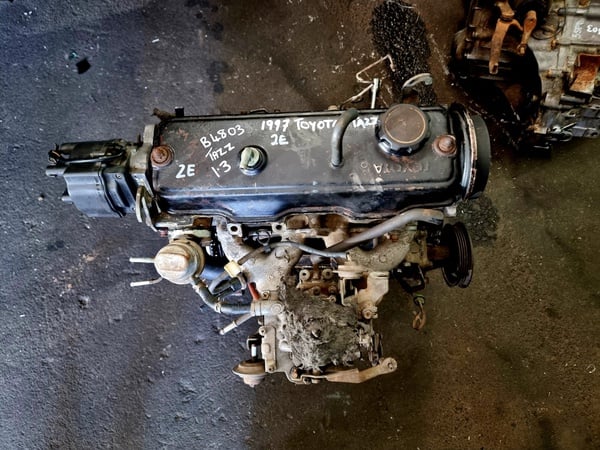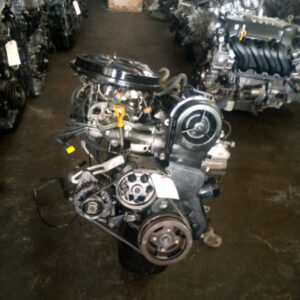Toyota Tazz: Understanding Its Popularity in the Used Car Market
Toyota Tazz: Understanding Its Popularity in the Used Car Market
Blog Article
Discover the current Trends in Engine Innovation Via Tazz
In the swiftly advancing landscape of auto modern technology, Tazz stands at the leading edge, highlighting considerable developments in engine systems that prioritize both technology and sustainability. From crossbreed engines that enhance fuel performance to the appearance of hydrogen gas cells, the trends forming modern-day powertrains are not only enhancing efficiency however also resolving essential ecological challenges.
Crossbreed Engine Innovations
Hybrid engine innovations stand for an essential shift in auto innovation, combining the advantages of internal burning engines with electric propulsion systems. This assimilation not only enhances gas efficiency yet also lowers discharges, conference progressively stringent ecological regulations. By making use of both energy resources, hybrid engines can optimize efficiency, delivering power when needed while preserving fuel throughout less requiring motoring conditions.
Current advancements in crossbreed technology include renovations in battery effectiveness and regenerative stopping systems. These innovations permit better energy recuperation throughout slowdown, which can be redirected to help in velocity or power auxiliary systems. Producers are concentrating on small layouts and light-weight materials to take full advantage of the performance of crossbreed powertrains.
The development of plug-in hybrids has likewise broadened the marketplace, making it possible for drivers to charge their cars utilizing common electric outlets. This attribute often permits considerable all-electric array, more lowering dependancy on traditional gas. tazz. As the automotive industry continues to evolve, hybrid engine technologies are expected to play an essential role in bridging the gap between conventional vehicles and totally electrical versions, supplying a transitional option that deals with diverse consumer needs and choices
Breakthroughs in Electric Powertrains
The auto landscape is swiftly progressing, with electric powertrains emerging as a leading pressure in lasting transport. Advancements in electric lorry (EV) modern technology are dramatically improving performance, efficiency, and customer experience. Trick developments consist of enhancements in battery chemistry, which have raised energy density, minimized charging times, and expanded general battery life.
Solid-state batteries, for instance, guarantee to revolutionize the marketplace by offering better security and efficiency contrasted to traditional lithium-ion cells. Moreover, developments in regenerative stopping systems are enabling lorries to recover power during slowdown, adding to general performance.
Along with battery modern technology, electric motor styles are coming to be much more advanced. Technologies such as integrated motors and progressed thermal monitoring systems are helping to enhance power shipment and lower weight, ultimately improving automobile characteristics.

Jointly, these developments highlight the dedication to shift towards cleaner, much more effective transportation services, positioning electrical powertrains at the center of vehicle advancement.
The Increase of Hydrogen Fuel Cells
Increasingly, hydrogen fuel cells are obtaining grip as a feasible option to conventional internal burning engines and battery electrical automobiles. This technology harnesses the chemical power kept in hydrogen, converting it into power via an electrochemical reaction with oxygen. The primary by-product of this process is water, making hydrogen fuel cells an eco friendly choice with no emissions at the tailpipe.

Automakers are significantly buying hydrogen fuel cell innovation, acknowledging its possibility for long-range applications and rapid refueling capabilities that equal standard gas. sites In addition, sectors such as durable transport and public transportation are specifically fit for hydrogen gas cells, where battery electrical solutions may fall short because of weight and variety restrictions.
As research study and financial investment proceed to increase, hydrogen gas cells are positioned to play a substantial duty in the future landscape of tidy transport and power remedies.
Enhancements in Internal Burning Engines
Technologies in inner burning engine (ICE) modern technology are changing typical lorries to fulfill modern-day ecological requirements and performance expectations. One of the most substantial improvements entails the combination of sophisticated fuel injection systems. These systems maximize the air-fuel combination, boosting burning effectiveness and resulting in reduced exhausts. Straight fuel injection, check here for instance, permits for far better atomization of fuel, resulting in more full combustion and enhanced power result.
Furthermore, turbocharging has obtained importance, allowing smaller sized engines to deliver greater performance without the weight of bigger engines - tazz. This technology not just increases efficiency however also adds to lower gas consumption. Variable shutoff timing systems are also being fine-tuned, enabling engines to adapt to numerous driving conditions for boosted torque and responsiveness
Furthermore, the usage of lightweight products in engine construction is ending up being basic, additional enhancing fuel performance by reducing general vehicle weight. Engine control systems (ECUs) are significantly sophisticated, allowing real-time changes that optimize performance and exhausts.
These improvements collectively symbolize a crucial shift in ICE innovation, straightening with global sustainability goals while still supplying the efficiency drivers anticipate from their automobiles. As the sector evolves, these improvements continue to shape the future of standard auto design.
Future Trends in Engine Efficiency
Considerable improvements in engine performance are prepared for as manufacturers focus on integrating innovative modern technologies to meet stringent environmental policies and consumer demands. The shift towards electrification, hybrid systems, and alternative fuels is reshaping the automobile landscape, driving developments that improve fuel economic climate and decrease discharges.
One of the essential trends is the implementation of advanced materials and manufacturing strategies. Light-weight compounds and high-strength alloys contribute to decreased vehicle weight, thus boosting total effectiveness. Furthermore, the adoption of turbocharging and variable valve timing modern technologies permits for boosted power outcome from smaller engines, further boosting gas economic climate.

Conclusion
Finally, the exploration of engine innovation reveals considerable advancements that focus on sustainability and efficiency. Advancements in crossbreed engine systems, electric powertrains, and hydrogen gas cells demonstrate a commitment to lowering discharges while boosting performance. Moreover, improvements in interior burning engines and a concentrate on lightweight products add to overall engine performance. As the vehicle sector continues to develop, these fads will certainly play an essential function fit a cleaner and more sustainable future for transportation.
From hybrid engines that optimize fuel effectiveness to the introduction of hydrogen gas cells, the fads forming modern-day powertrains are not just boosting efficiency yet additionally addressing crucial environmental challenges.Hybrid engine developments represent a critical shift in automobile technology, combining the benefits of internal burning engines with electrical propulsion systems.In addition, turbocharging has actually gotten importance, enabling smaller engines to deliver higher efficiency without the weight of bigger engines. Furthermore, the adoption of turbocharging and variable valve timing technologies permits for boosted power outcome from smaller engines, further enhancing gas economic climate.
Enhancements in internal burning engines and an emphasis on lightweight products add to general engine efficiency.
Report this page